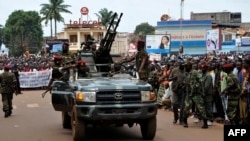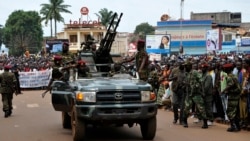Rebels in the Central African Republic unhappy with the implementation of a January peace agreement have seized the capital, ousted the president and named a replacement outside of the provisions of the peace accord and constitutional framework.
The United States is deeply concerned about a serious deterioration of the security situation there and urgently calls on leaders of the Seleka rebel alliance to establish law and order and restore basic services of electricity and water. We also ask that all parties allow for unhindered humanitarian access.
About 5,000 Seleka fighters, an alliance of four separate armed groups hostile to President Francois Bozize, swept into the capital Bangui on March 24, after reviving their fight against the government in recent weeks. After Bozize fled to neighboring Cameroon, Seleka leader Michel Djotodia proclaimed himself president, pledging to restore order and form a power-sharing government.
January’s peace accord, signed in Libreville, Gabon, and drafted by regional mediators, had created a government that kept Bozize in office with reduced powers, while vesting authority in a unity government led by Prime Minister Nicolas Tiangaye, with ministers drawn from the government, the Seleka rebels and the civilian opposition.
We strongly urge the Seleka leadership to recognize the continued legitimacy of the Libreville Accord. An inclusive discussion of all parties to that agreement is the right way to make any decisions concerning the country’s government structure.
We also call on all parties to ensure that their forces respect the human rights of the Central African people and other individuals in the C.A.R. Those abusing those rights, either Seleka fighters or national security forces, must be held accountable.
The United States is deeply concerned about a serious deterioration of the security situation there and urgently calls on leaders of the Seleka rebel alliance to establish law and order and restore basic services of electricity and water. We also ask that all parties allow for unhindered humanitarian access.
About 5,000 Seleka fighters, an alliance of four separate armed groups hostile to President Francois Bozize, swept into the capital Bangui on March 24, after reviving their fight against the government in recent weeks. After Bozize fled to neighboring Cameroon, Seleka leader Michel Djotodia proclaimed himself president, pledging to restore order and form a power-sharing government.
We strongly urge the Seleka leadership to recognize the continued legitimacy of the Libreville Accord.
January’s peace accord, signed in Libreville, Gabon, and drafted by regional mediators, had created a government that kept Bozize in office with reduced powers, while vesting authority in a unity government led by Prime Minister Nicolas Tiangaye, with ministers drawn from the government, the Seleka rebels and the civilian opposition.
We strongly urge the Seleka leadership to recognize the continued legitimacy of the Libreville Accord. An inclusive discussion of all parties to that agreement is the right way to make any decisions concerning the country’s government structure.
We also call on all parties to ensure that their forces respect the human rights of the Central African people and other individuals in the C.A.R. Those abusing those rights, either Seleka fighters or national security forces, must be held accountable.






